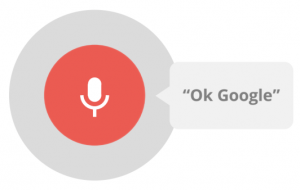I’m currently not typing this article but I’m sat at my desk dictating into my iPhone. Admittedly for the length of this blog article dictating is perhaps quite tedious and my Yorkshire accent causes the odd awkward error, but I find this technology quite remarkable.
It highlights how frighteningly intelligent our mobile devices have become and how the development of speech recognition technology is continuing to impress and become more sophisticated. Thankfully we are not yet at the stage in which the film, Her, becomes a reality…
Whether you have an iPhone, Android, tablet or PC, hands-free search has become prevalent in our online search behaviors and marketers are taking note of the more detailed and conversational queries. This may mean that social media becomes even more important than ever, as well as the importance of brand authority for search results.
Voice commands now take reviews and ratings into account so having a solid reputation can give businesses a clearer edge for local search.
Googles Matt Cutts spoke last year about the development of voice search and how evolving syntax could be a game-changer:
Cutts states that:
- As voice commands are becoming longer and more conversational, Googles semantic index will expand meaning search results will be more specific.
- The importance of follow-up questions in search so users get the best response e.g. ‘bands playing in Leeds’, followed by, ‘which bands are playing at the First Direct Arena in Leeds during August?’
In late June it was announced that all Android devices would respond to the code word ‘Ok Google’ from the home screen or search widget. This code word allows users to conduct an online search using the Google Now app. You can also use ‘Ok Google’ to set alarms, set notes and get directions.

Google have recently pushed this feature as part of a UK television campaign which sees voice search save the day when a user fails miserably to bake a cake. It was quite an achievement to make a ladybird look so depressed!
The potential for voice recognition within search is immense. Although it may be some amount of time before speech becomes a primary search input, Google developers must stay ahead of the game to compete with the likes of Apples Siri technology.
Googles voice search now supports over 42 languages and its development is continuing to grow. From a digital marketing perspective it is important, more than ever, that content is targeted specifically at the right audience in order to achieve engagement and boost brand authority. Equally as important is that websites are mobile friendly, with either a mobile site or a responsive design. As we speak faster than we type, it is easy to see why this technology is taking an effect on how we search particularly on mobile devices.



